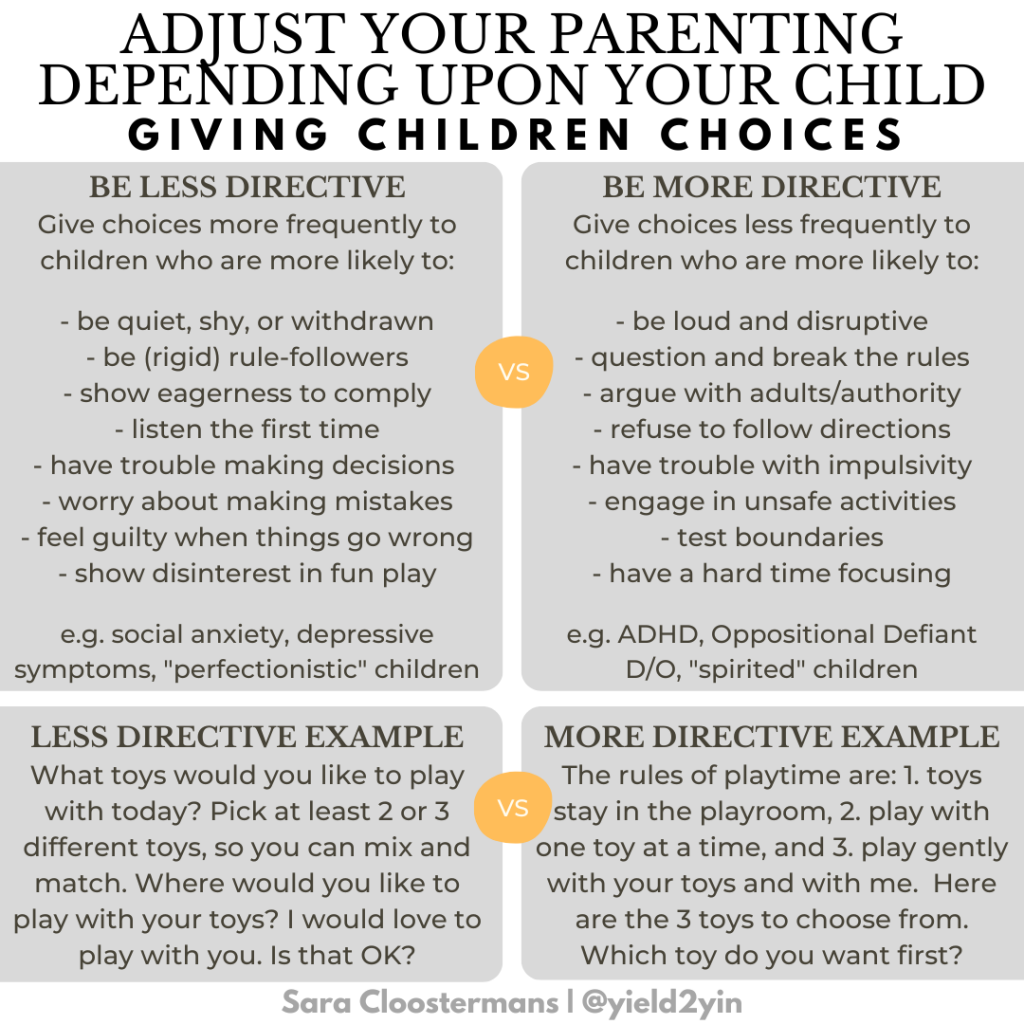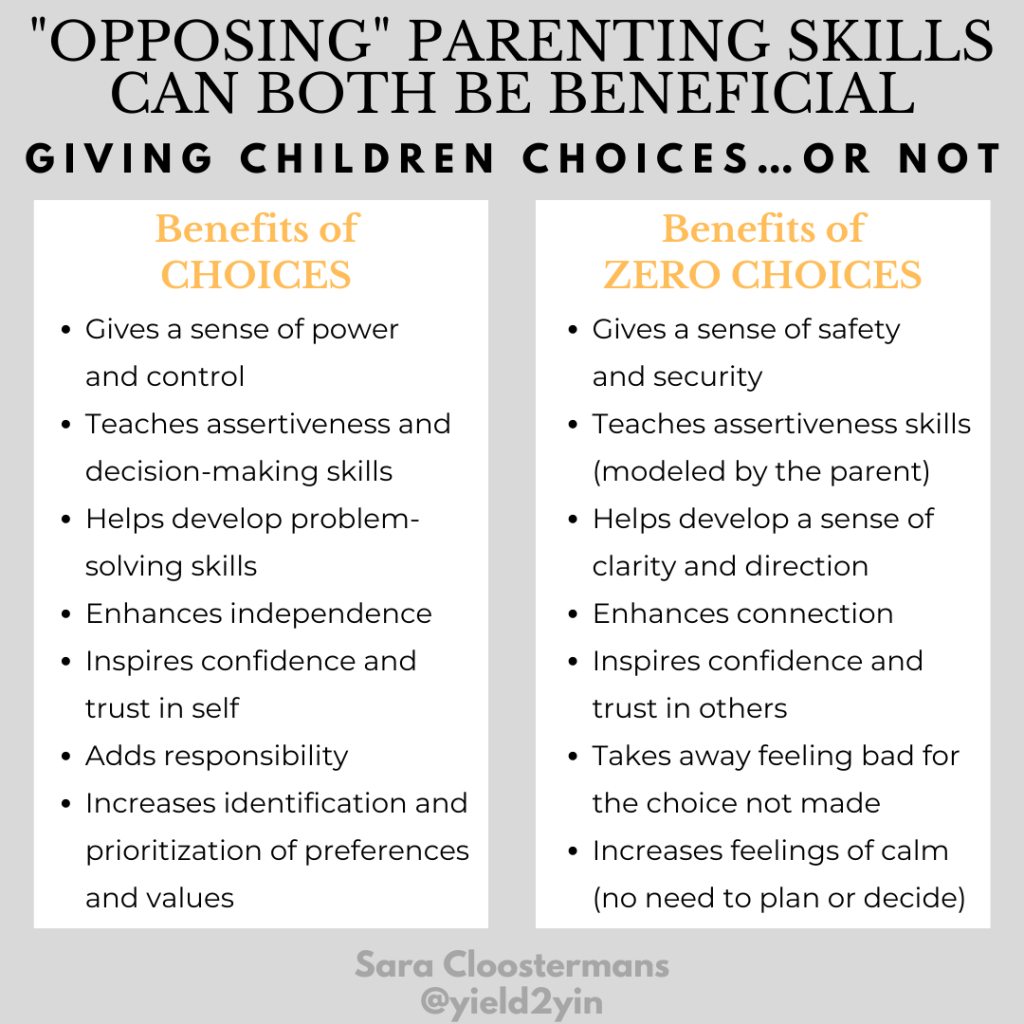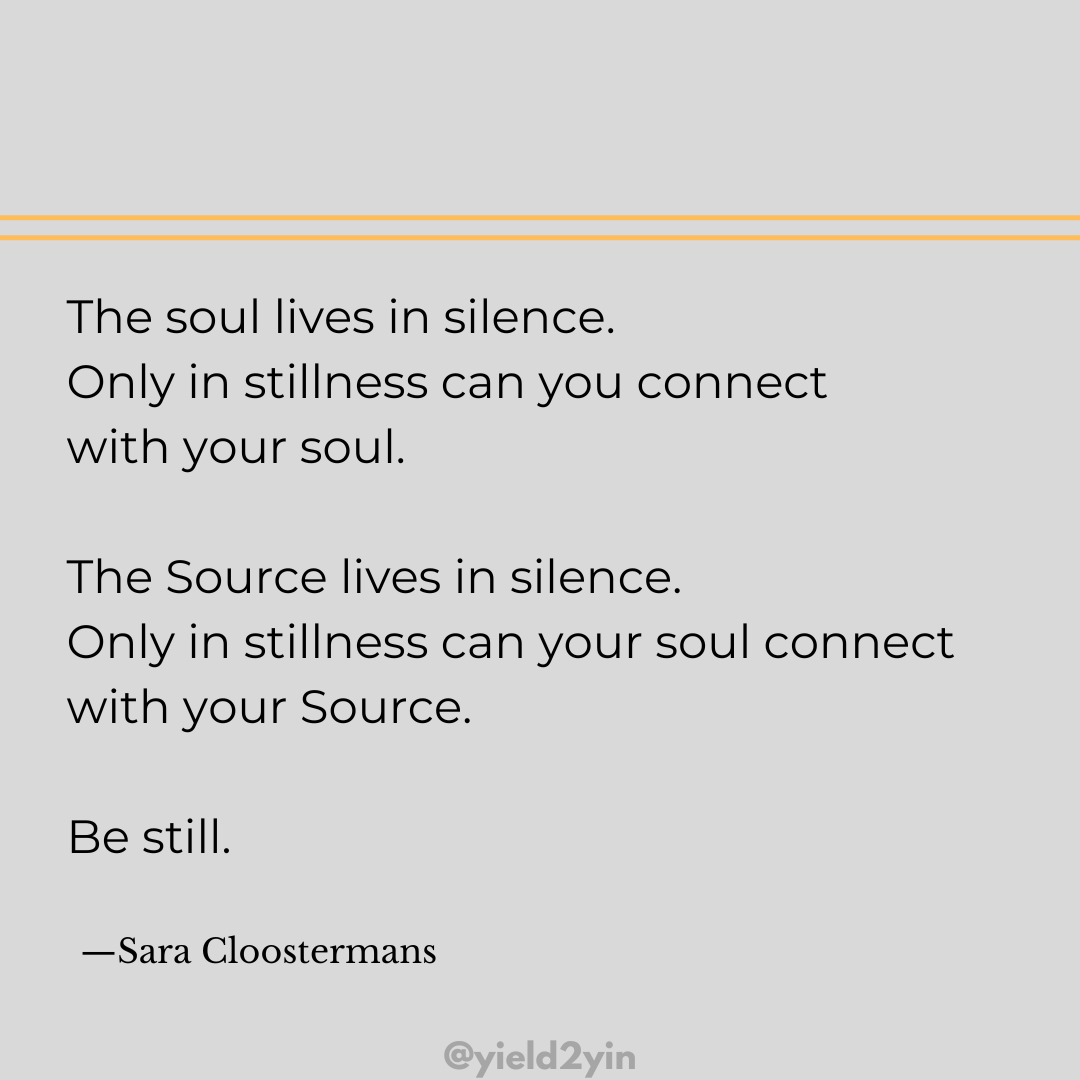I have an inkling that what comes next may be an unpopular opinion, but keep in mind that this is all it is: one opinion.
It is my opinion that we are giving our young children way too many choices and that we should lay off doing this, giving choices that is, so frequently.
I am not referring to skill-building choices as in the Giving Children Choices parenting blog.
I am also not referring to the number of choices, such as the difference between giving just two or three choices (preferred), or giving more than three choices. Giving too many choices is discouraged because it may lead to “Choice overload: the tendency for people to get overwhelmed when they are presented with a large number of options, often used interchangeably with the term paradox of choice.”
I am referring to the constancy of including our children in the daily decision-making. I’m suggesting we need to reduce that constancy. Read on!
Why Give Fewer Choices? Power, Control, Overwhelm & Structure
Why are we putting our children in a position where they have to make hard choices so early on in their lives and so frequently? Giving choices too often can make our children feel overwhelmed and lead to extreme emotional dysregulation (resulting in unruly behavior).
If we give our children continuous choices around the clock, they start feeling powerless and out of control.
Sara Cloostermans
The choices we persistently present our children with may all be acceptable, and seemingly harmless; they may seem like minor input requests in the daily planning and management of our household. Yet, when we take their developmental age into consideration, these choices can in fact be really hard and stressful for our children.
For example: “Do you want to have Jade or Mackenzie over for a playdate today?” seems like an innocuous question, yet remember how tough it is for you, the grown adult, to decide who to invite to your birthday get-together and who not to invite?
Let’s look at this a different way: since most of us agree that offering choices gives children a sense of power and control, why would it not be possible that, if we give our children continuous choices around the clock, they start feeling powerless and out of control?
- Powerless: If your child answers “Jade,” that means Mackenzie is not coming over, and if they answer “Mackenzie,” it means Jade is not coming over.
- Out of control: Put yourself in your child’s shoes – when you have a lot of these types of decisions to make, don’t you feel out of control? Doesn’t your head start spinning?
These two feelings boil down to the following concept: “Opportunity Cost” (or “Missed Opportunities”), which comes from The Decision Lab.
“Opportunity cost/missed opportunities: the benefits of options that are not chosen when one makes a certain choice. This includes hypothesizing about missed opportunities and can be mentally costly to calculate.”
Isn’t there a flip side to most things? Aren’t there two extreme opposites once we look at things on a continuum? In this case, on one side of the continuum we constantly give our children choices and on the extreme other side we never give them any choices?
Let me be clear: I am NOT recommending the latter, but I am encouraging more BALANCE between the two.
Have you noticed that, quite often, our children are able to stay emotionally regulated at school (resulting in cooperative behavior), but then as soon as they come home, their wheels come off ?
Yes, I understand that one of the reasons is that they have had to hold it together all day long and now is a safe time and place for them to fall apart. They are finally back in their safe haven with the people who love them unconditionally. Agreed.
However, I also believe that another reason is because, in school, there is a predictable routine, clear structure, and specific set of rules. There is consistency, and follow through, including with the consequences that are given when the school or classroom rules are being tested or broken.
This level of structure and routine is not always present in our homes. We give our children too much leeway, such as by offering choices too often, because we feel guilty, are tired, or probably both. There is no doubt that parenting is one of the hardest jobs we will ever do. However, if we make our children’s home life more predictable, parenting becomes easier.
I’m not suggesting that we completely rob our children of having choices. I’m only encouraging parents to consider reducing the number of times we give our kids choices.
Providing them with a set schedule at home – action items that have already been decided on – gives them a solid framework. This structure helps them with organizing their thoughts; they know what is coming next and what the expectations are, which makes them feel safe and supported. There are less uncertainties they have to learn to tolerate.
And since life throws us plenty of curve balls, there will still be ample instances/opportunities when our children will have to make choices – both easy ones and difficult ones – as well as tolerate uncertainties (the not knowing what the outcome of their particular choice is going to be).
Examples of Fewer Choices & Too Many Choices
Every time I travel to Europe to visit my family, which is at least once a year, I am reminded that there are less to no food issues with babies, toddlers, and young children in the different families that I have my meals with: everyone at the dinner table eats pretty much the same things (making allowances for certain food aversions and food allergies, of course).
Once the babies are allowed to eat solid foods, the parent puts whatever the family is having in a blender. For example, if the family is having potatoes, green beans, and burgers for dinner, the potatoes, green beans and some burger meat goes into the blender (before adding spices, except for some salt and olive oil maybe). Et voilà, the baby’s dinner is ready to be spoon-fed to them – no fuss, no muss! Once the babies have a fair amount of teeth, the same food is presented to them separately (not blended) as finger foods (and with a baby fork or spoon option).
This scenario of fewer dinner-table choices leads to less stress and overwhelm for children and parents.
Next we have an example on the other side of the spectrum. Iris (not her real name), a former client of mine, was barely out of middle school, when her parents were in the market for a new home in an exclusive neighborhood. Iris asked her parents if she would be allowed to pick out the next family home and, lo and behold, they agreed to this. Iris was given a budget that ran in the millions and off she went house hunting. When she found her dream place and showed it to her parents, they were on board and bought it.
Is it just me or does anyone else see what is wrong with this picture?
This young teen did not have the mental maturity nor life experience to understand the complexity of choosing a home for her family. All in due time!
“Because I Said So”
Is it not a valuable lesson to teach our kids that not everything in life is a choice? Isn’t it true that, quite often, it is “because they” (the teacher, or the swim instructor, or Jade’s mother) “said so” … and later, “because they” (the professor, the boss, the law, etc.) “said so?”
I hope it goes without saying (but I will say it anyways) that I am only referring to appropriate choices and interactions – NEVER should any of us condone any type of manipulation or abuse.
I know parents’ answer “because I said so” has fallen out of favor, but I think it is OK to bring it back (within reason). Not everything needs to be explained in great detail to our children all the time – this is exhausting to both parents and children.
Sometimes, “Because I said so” is the way to go. It takes the pressure off our young children; they no longer have to wonder if they made the “right” choice.
“Because I said so” – I dare you to try it:
Parent: “Samantha is coming over for a playdate this morning.”
Child: “Why? I want Jade or Mackenzie over!”
Parent: “Because I said so.” You could even add “Not everything in life is a choice.”
Then you could reflect your child’s feeling(s): “You would rather have one of your other friends over; I understand that you feel disappointed and frustrated with my decision.”
The accurate explanation may be because Samantha’s parents approached you and told you in confidence that their daughter, as the new kid in school or as the shy kid in class, is having a difficult time making friends. They asked if you would be open to having the children meet for a playdate, and you agreed. You may not want to give your child this explanation because your child has been known to be a babble mouth. Really, it does not matter, you truly DO NOT have to EXPLAIN EVERYTHING to your child.
Here are some more examples of “Because I said so”:
- This is the outfit you are wearing to school this morning.
- Samantha is coming over to have lunch with us, and then play with you for a little bit until it is time for you to take a nap.
- You are trying out for the “guppies” swim level this afternoon.
- For snack time, you are having a banana.
- Today, you are coming to the grocery store with mommy while your sister stays home with the babysitter.
- The family movie on pizza night will be “Inside Out”.
- We are reading “The Boy, the Mole, the Fox and the Horse” before bedtime this evening.
- Daddy is putting you to bed tonight.
Adjust The Choices Parenting Skill To Your Child
Each individual child has different needs and wants, so make sure to tailor your parenting to the type of child you have. Pay attention to their moods (incl. how they experience/perceive the world and what their sensitivities/vulnerabilities are), their behaviors, their communication (verbal and non-verbal), their likes/dislikes, their history as well as current life circumstances, and most importantly, their soul self.
One of the parenting skills to adjust according to the kind of child you brought into this world is the giving choices parenting skill.
Be less directive, so use the giving choices parenting skill more frequently, with children who are rule-followers (and maybe even show some rigidity around rules), usually listen the first time, or are more quiet, shy, or withdrawn.
Be more directive, so use the giving choices parenting skill less frequently, with children who are more likely to be uncooperative, test boundaries and break the rules; children who have a hard time with compliance and following directions.

The Benefits of Choices and the Benefits of Zero Choices

NOTE: I am NOT saying that it should be either one or the other because, ironically, both extreme approaches lead to the same outcome: our children feeling powerless and out of control. I am, instead, advocating for more BALANCE by decreasing the times we offer two or more choices and increasing the times we offer zero choices (or vice versa depending on your parenting style):
- too many choices all the time = permissive parenting style
- no choices ever = authoritarian parenting style
- balance = authoritative parenting
Learn more about the types of parenting styles and how kids are affected!
Yield2Yin
- Healing Card Deck: A Therapist’s Advice 55-Card Healing Deck by Sara Cloostermans
- Book Recommendation: The Paradox of Choice: Why More Is Less by Barry Schwartz
- Mantra: I AM BALANCE // with diaphragmatic breathing
- Yin Yoga Asana: Square Pose







